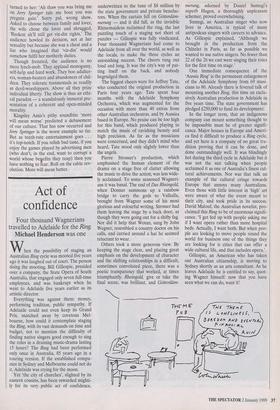Act of confidence
Four thousand Wagnerians travelled to Adelaide for the Ring. Michael Henderson was one When the possibility of staging an Australian Ring cycle was mooted five years ago it was laughed out of court. The person doing the mooting, Bill Gillespie, presided over a company, the State Opera of South Australia, that engaged only seven full-time employees, and was bankrupt when he went to Adelaide five years earlier as its artistic director.
Everything was against them: money, performing tradition, public sympathy. If Adelaide could not even keep its Grand Prix, snatched away by covetous Mel- bourne, how could it contemplate staging the Ring, with its vast demands on time and budget, not to mention the difficulty of finding native singers good enough to sing the roles in a draining music-drama lasting 15 hours? The Ring had been performed only once in Australia, 85 years ago in a touring version. If the established compa- nies in Sydney and Melbourne could not do it, Adelaide was crying for the moon.
Yet 'the city of churches', slighted by its eastern cousins, has been rewarded mighti- ly for its very public act of confidence, underwritten to the tune of $8 million by the state government and private benefac- tors. When the curtain fell on Gotterdiiin- merung — and it did fall, as the invisible Rhinemaidens reclaimed the ring, the last puzzling touch of a staging not short of puzzles — Gillespie was fully vindicated. Four thousand Wagnerians had come to Adelaide from all over the world, as well as the locals, to make the three cycles an astonishing success. The cheers rang out loud and long. It was the city's way of pat- ting itself on the back, and nobody begrudged them.
The biggest cheers were for Jeffrey Tate, who conducted the original production in Paris four years ago. Tate spent four months with the Adelaide Symphony Orchestra, which was augmented for the occasion with more than 40 extras from other Australian orchestras, and by Aussies based in Europe. No praise can be too high for this band, which produced playing to match the music of ravishing beauty and high precision. As far as the musicians were concerned, and they didn't mind who heard, Tate stood only slightly lower than the angels.
Pierre Strosser's production, which emphasised the human element of the drama on a stage free of clutter allowing the music to drive the action, was less wide- ly acclaimed. To some seasoned Wagneri- ans it was banal. The end of Das Rheingold, when Donner summons up a rainbow bridge to carry the gods to Valhalla, brought from Wagner some of his most glorious and colourful writing. Strosser had them leaving the stage by a back door, as though they were going out for a shifty fag. Nor did it help that Wotan, sung by John Wegner, resembled a country doctor on his calls, and carried around a hat he seemed reluctant to wear.
Others took a more generous view. By keeping the stage clear, and placing great emphasis on the development of character and the shifting relationships in a difficult, sometimes convoluted piece, there was a poetic transparency that worked, at times triumphantly. Rheingold, give or take the final scene, was brilliant, and GOtterdam- mening, adorned by Daniel Sumegi's superb Hagen, a thoroughly unpleasant schemer, proved overwhelming.
Sumegi, an Australian singer who now lives in America, is typical of many antipodean singers with careers to advance. As Gillespie explained, 'Although we brought in the production from the Chatelet in Paris, as far as possible we wanted to use native singers. No fewer than 22 of the 26 we cast were singing their roles for the first time on stage.'
One immediate consequence of the `Aussie Ring' is the permanent enlargement of the Adelaide Symphony from 69 musi- cians to 80. Already there is fevered talk of mounting another Ring, this time an exclu- sively Australian production in Adelaide in five years time. The state government has pledged £250,000 to fund its development.
In the longer term, that an indigenous company can mount something thought to be impossible must be of greater signifi- cance. Major houses in Europe and Ameri- ca find it difficult to produce a Ring cycle, and yet here is a company of no great tra- dition proving that it can be done, and done outstandingly well. It was blindingly hot during the third cycle in Adelaide but it was not the sun talking when people acclaimed it as one of Australia's finest cul- tural achievements. Nor was that talk an example of the cultural cringe towards Europe that annoys many Australians. Even those with little interest in 'high' art were aware of what the event meant to their city, and took pride in its success. David Malouf, the Australian novelist, pro- claimed this Ring to be of enormous signifi- cance. 'I get fed up with people asking me if I want opera rather than more hospital beds. Actually, I want both. But when peo- ple are looking to move people round the world for business one of the things they are looking for is cities that can offer a wide cultural life, and that includes opera.'
Gillespie, an American who has taken out Australian citizenship, is moving to Sydney shortly as an arts consultant. As he leaves Adelaide he is entitled to say, quot- ing Wagner himself: now that you have seen what we can do, want it!


























































 Previous page
Previous page